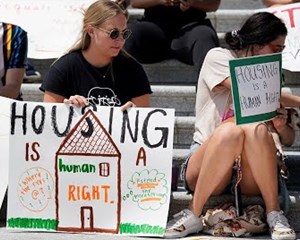JUDY WOODRUFF: We have two lead stories out of Washington tonight. First, the country is on the verge of a massive wave of housing instability after the federal ban on rental evictions expired over the weekend. Congress failed to extend a moratorium. And President Biden declined to do so in the face of a court order. Today, Gene Sperling, who is the White House coordinator of pandemic recovery funds, said the president's hands are tied after a Supreme Court ruling in June made it clear that another extension by presidential order wouldn't stand.
GENE SPERLING, White House American Rescue Plan Coordinator: The wording in the Supreme Court opinion was fairly clear that they said the CDC could not grant such extension without -- quote -- "clear and specific congressional authorization." I think, really, what has happened, what we are all dealing with is that the rise of the Delta variant is particularly harmful for those who are most likely to face evictions. And as that reality became more clear going into the end of last week, I think all of us started asking, what more could we do?
JUDY WOODRUFF: And our White House correspondent, Yamiche Alcindor, joins me now. So, Yamiche, tell us more about what is behind the president's decision not to extend this ban himself? And what is making this issue so contentious?

YAMICHE ALCINDOR: Well, the federal moratorium and the contention and scrambling around it comes to two big things, law and politics. On the legal side, White House aides, Gene Sperling, a number of other sources I have been talking to, they have been underscoring the idea that President Biden didn't think that he had the legal authority to extend this eviction moratorium. They say they looked around. They could not find any legal option to do that, because the Supreme Court said that there would need to be congressional authorization if a presidential order was to extend the ban. They also say that the CDC looked into this, even looking into targeted eviction moratoriums for areas with high infection rates. And even that, in that limited way, it was also seen as not a legal option. That said, when I pushed Gene Sperling and when I talked to sources, there's another issue here, and that is that the White House does not want to go to the Supreme Court and have the court strike down other sort of federal policies that make broad use of public health laws. So that's somewhat of their thinking. Then there's the politics of this. We saw House Speaker Nancy Pelosi come out and urge President Biden to extend this eviction moratorium. Progressives are also saying the White House waited too long, that they should have been dealing with this issue at all. But the president then again says his hands are tied, that Congress needs to be doing something. And he's also pushing states and localities to try to provide resources to people.
JUDY WOODRUFF: So, given all that, where does this go from here?
YAMICHE ALCINDOR: Well, that's the big question. Gene Sperling today said that thousands of Americans could be facing evictions. President Biden says that he's going to be double-, triple-checking. He's going to be kicking the tires to try to find legal options and other ways to help people. But there really is a big question of what more of the White House and Congress can do. They're -- really, the White House is really putting it in the hands of Congress and local authorities. But that is where some people feel as though the White House is scapegoating, shifting the blame here, shifting responsibility. The White House, though, is underscoring they're doing all that they can.
JUDY WOODRUFF: All right, Yamiche Alcindor on this fast-moving story, thank you very much.
YAMICHE ALCINDOR: Thanks.











